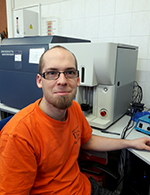Martin Báječný, MSc.

Topic:
Identification of hematopoietic stem/progenitor cells by imaging cytometry
 www.researchgate.net/profile/Martin_Bajecny
www.researchgate.net/profile/Martin_Bajecny
Martin Báječný Publications
Hematopoiesis Remains Permissive to Bone Marrow Transplantation After Expansion of Progenitors and Resumption of Blood Cell Production.
Báječný, M., Chen C.-L.,Faltusová, K., Heizer T., Sziskszai K., Páral P., Šefc, L., and Nečas, E. (2021)., Front. Cell Dev. Biol., https://doi.org/10.3389/fcell.2021.660617
Abstract:
The immense regenerative power of hematopoietic tissue stems from the activation of the immature stem cells and the progenitor cells. After partial damage, hematopoiesis is reconstituted through a period of intense regeneration when blood cell production originates from erythro-myeloid progenitors in the virtual absence of stem cells. Since the damaged hematopoiesis can also be reconstituted from transplanted hematopoietic cells, we asked whether this also leads to the transient state when activated progenitors initially execute blood cell production. We first showed that the early reconstitution of hematopoiesis from transplanted cells gives rise to extended populations of developmentally advanced but altered progenitor cells, similar to those previously identified in the bone marrow regenerating from endogenous cells. We then identified the cells that give rise to these progenitors after transplantation as LSK CD48– cells. In the submyeloablative irradiated host mice, the transplanted LSK CD48– cells preferably colonized the spleen. Unlike the endogenous hematopoiesis reconstituting cells, the transplanted whole bone marrow cells and sorted LSK CD48– cells had greater potential to differentiate to B-lymphopoiesis. Separate transplantation of the CD150– and CD150+ subsets of LSK CD48– cells suggested that CD150– cells had a greater preference to B-lymphopoiesis than CD150+ cells. In the intensively regenerating hematopoiesis, the CD71/Sca-1 plot of immature murine hematopoietic cells revealed that the expanded populations of altered myeloid progenitors were highly variable in the different places of hematopoietic tissues. This high variability is likely caused by the heterogeneity of the hematopoiesis supporting stroma. Lastly, we demonstrate that during the period when active hematopoiesis resumes from transplanted cells, the hematopoietic tissues still remain highly permissive for further engraftment of transplanted cells, particularly the stem cells. Thus, these results provide a rationale for the transplantation of the hematopoietic stem cells in successive doses that could be used to boost the transplantation outcome.
Altered erythro-myeloid progenitor cells are highly expanded in intensively regenerating hematopoiesis.
K. Faltusová, C-L. Chen , T. Heizer, M. Báječný, K. Szikszai, P. Páral, F. Savvulidi, N. Renešová and E.Necas (2020), Front. Cell Dev. Biol. doi: 10.3389/fcell.2020.00098
T-lymphopoiesis is Severely Compromised in Ubiquitin-Green Fluorescent Protein Transgenic Mice
K. Faltusová, M. Báječný, T. Heizer, P. Páral, E. Nečas (2020), FOLIA BIOL (PRAHA). Accepted.
Cell Cycle Analysis Using In Vivo Staining of DNA-Synthesizing Cells.
Páral P., Báječný M., Savvulidi F., Nečas E. (2019), Methods Mol Biol. doi: 10.1007/7651_2019_228.
Stem Cell Defect in Ubiquitin-Green Fluorescent Protein Mice Facilitates Engraftment of Lymphoid-Primed Hematopoietic Stem Cells.
Faltusová, K., Szikszai, K., Molík, M., Linhartová, J., Páral, P., Šefc, L., Savvulidi, F. and Nečas, E. (2018), STEM CELLS. doi: 0.1002/stem.2828.
Cell cycle and differentiation of Sca-1 + and Sca-1 − hematopoietic stem and progenitor cells.
Páral, P., Faltusová, K., Molík, M., Renešová, N., Šefc, L., and Nečas, E. (2018)., Cell Cycle 17, 1979–1991. doi:10.1080/15384101.2018.1502573
Low c-Kit Expression Level Induced by Stem Cell Factor Does Not Compromise Transplantation of Hematopoietic Stem Cells.
Chen C-L, Faltusova K, Molik M, Savvulidi F, Chang K-T, Necas E. Biol Blood Marrow Transplant 2016, 22:1167–1172.
Martin Báječný Posters
Forward scatter (FSC) and Side scatter (SSC) identifies LSK cells from regenerating bone marrow as late myeloid progenitors in the mouse
Molík M., Faltusová K., Savvulidi F., Ch-L. Chen, Páral P., Heizer T., Nečas E.; CYTO, Prague, 2018

